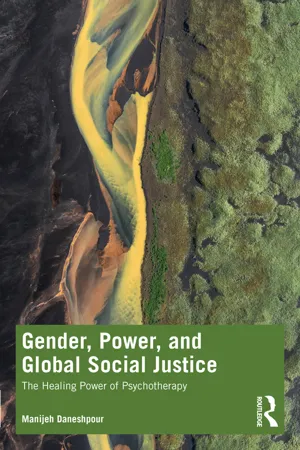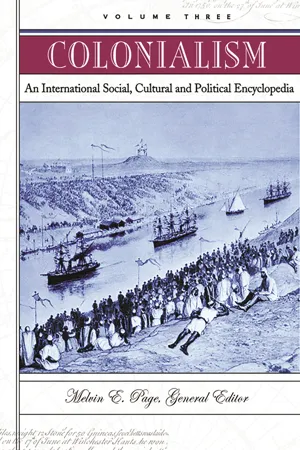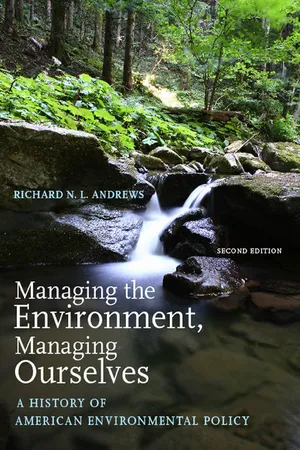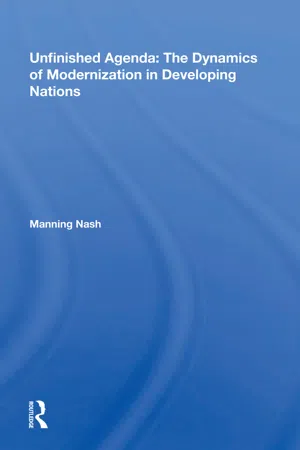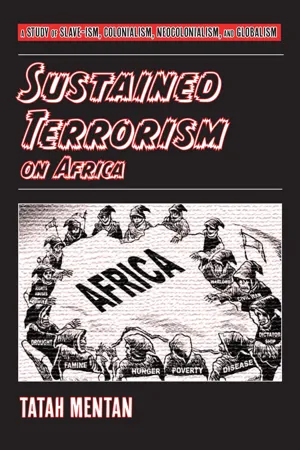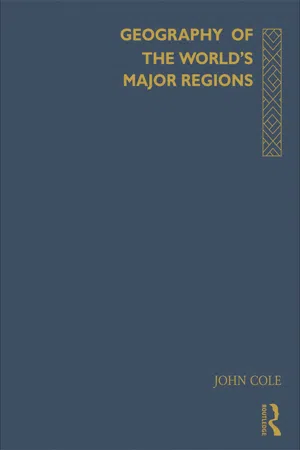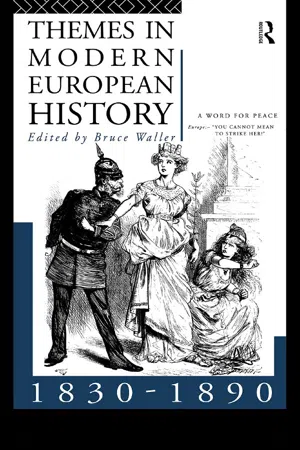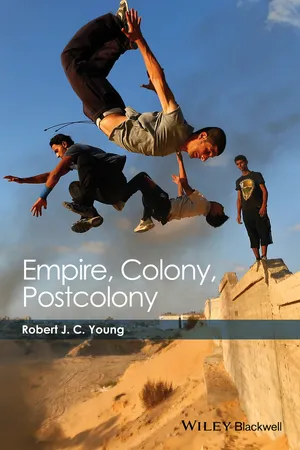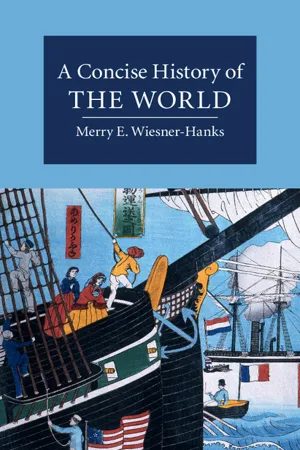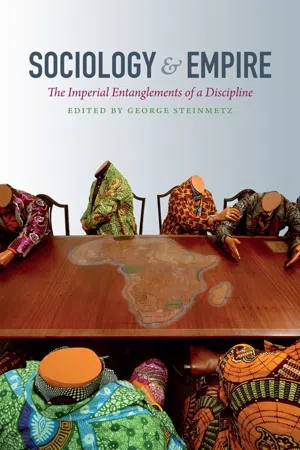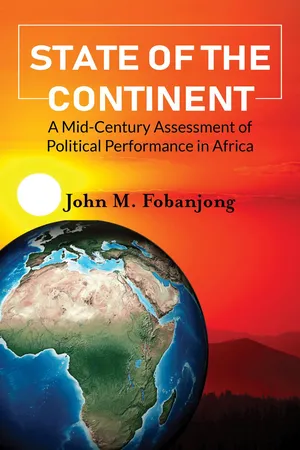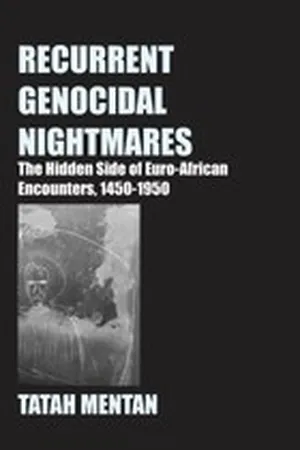History
European Colonization
European colonization refers to the period when European powers established control over territories outside of Europe, primarily during the 15th to 19th centuries. This expansion was driven by economic, political, and religious motives, leading to the establishment of colonies in the Americas, Africa, Asia, and Oceania. The impact of European colonization was profound, shaping the cultures, economies, and political landscapes of the colonized regions.
Written by Perlego with AI-assistance
Related key terms
1 of 5
12 Key excerpts on "European Colonization"
- eBook - ePub
Gender, Power, and Global Social Justice
The Healing Power of Psychotherapy
- Manijeh Daneshpour(Author)
- 2022(Publication Date)
- Routledge(Publisher)
4 The Impact of Colonization on Global Social JusticeDOI: 10.4324/9781003088189-5Introduction
According to the Merriam-Webster Dictionary, colonialism is defined as “controlled by one power over a dependent area or people.” More specifically, colonialism is about one or more nations or countries overpowering and suppressing other countries: dominating its population, using its natural and human resources while imposing its own language and cultural values on the people of the country they conquered. By 1914, a large majority of the world’s nations were colonized by European governments (Ferrante, 2007 ). The concepts of colonialism and imperialism are closely linked to the policy or tenet of utilizing force and power to control another nation or people perfectly under imperialism and colonialism. However, the word colony comes from the Latin word colonia, which means farm or state. This indicates that the practice of colonialism usually included transferring people from their own homes to a new territory. At the same time, the colonizers and settlers lived permanently on the indigenous people’s lands and maintained political and cultural commitment and loyalty to their country of origin. Imperialism, however, comes from the Latin term imperium, which means order and control. Therefore, the term imperialism defines one country as overpowering another, whether through settlement, dominance, or any ancillary mechanisms of control (Kohn & Reddy, 2017 ).Colonialism History
Big empires like Ancient Greece, Ancient Rome, Ancient Egypt, and Phoenicia practiced colonialism in ancient times. These civilizations stretched their borders to utilize the resources of other nations starting around 1550 BC. They formed colonies to capture the physical and human resources of the people they overpowered to spread their control. Modern colonialism began during the Age of Discovery in the fifteenth century when Portugal started looking for new trade routes outside of Europe. The Portuguese colonial empire was the first and the last European empire that started from the conquest of Ceuta in 1415, and then Morocco, North Africa, and continued until the formal surrender of Macau to the People’s Republic of China in 1999 (Bandeira Jerónimo, 2018 ). Soon after, Portugal’s competing nation, Spain, searched for new lands. In 1492, Christopher Columbus started exploring a western route to India and China (Bandeira Jerónimo, 2018 ). However, he landed in the Bahamas, which was the beginning of the power of the Spanish and Portuguese empires in the Americas, India, Africa, and Asia. In the meantime, England, the Netherlands, France, and Germany started building their own empires abroad, battling Spain and Portugal over the lands they had already dominated and occupied. In the eighteenth and nineteenth centuries, many of these colonies managed to earn independence starting with the American Revolution in 1776, and the Haitian Revolution in 1781. Nonetheless, the eastern half of the world continued to attract European colonial powers. They started taking over African lands, fighting each other to access these nations’ natural resources, and establishing colonies until the decolonization beginning around 1914 to 1975 (Bandeira Jerónimo, 2018 - eBook - PDF
Colonialism
An International Social, Cultural, and Political Encyclopedia [3 volumes]
- Melvin E. Page(Author)
- 2003(Publication Date)
- ABC-CLIO(Publisher)
Page xx This page intentionally left blank Page xxi Preface Colonialism is certainly one of the enduring concepts in human history. Because of its longevity as an analytical framework, however, colonialism has been understood in a variety of ways. Since the concept was formalized in the era of Greek settlements beyond the cities of their Aegean peninsulas, human societies have sent their citizens to distant lands, creating new iterations of their ways of life in distant settlements. Often in the process, one society sought to dominate another, extending political, economic, and sometimes even social power over another people. So common was this settlement and domination pattern in human history, the very term colonialism occasionally came to signify any sort of domination or assertion of control by one human group over another, often achieved by trickery and usually involving illegitimate means. As a result of these varied definitions, colonialism has been used by historians, sociologists, political scientists, and many others as a concept to denote many different situations and conditions. Some begin chronologically by using the term to describe the extension of the range of early hominids outside of Africa into many regions of Eurasia. Still others have come to use the same concept in considering the sometimes overwhelming impact of new technologies on human life in the twenty first century. Frequently these extended uses of the term colonialism offer politically satisfying characterizations of the human condition. At the same time, in an era of analytical frameworks that emphasize the importance of language and discourse in assigning meaning to the human past, it seems essential to be more precise in defining the scope and meaning of any work such as this that claims to be an encyclopedia of colonialism. - eBook - PDF
Managing the Environment, Managing Ourselves
A History of American Environmental Policy, Second Edition
- Richard N. L. Andrews(Author)
- 2008(Publication Date)
- Yale University Press(Publisher)
These images produced a powerful and widespread belief in American ‘‘exceptional-ism’’: a belief that for better or worse America was a radically di√erent environment—and ultimately, society—from the ‘‘Old World’’ of Europe (Greene 1993, 5–7). Colonization, then, was among other things an environmental policy. In the broadest sense, it was a policy of expanding the accessible environment of each empire—its physical resources as well as its economic and political control—to a larger and larger portion of the world. More precisely, it was an environmental policy to benefit the ruling political and economic classes of each empire. It provided them with natural resources they desired Historical Context 19 Figure 1. European global exploration and trade routes in the fifteenth and sixteenth centuries. [From Leften Stavrianos, The World Since 1500: A Global History, 7th edition, ∫ 1995, p. 411. Reprinted by permis-sion of Pearson Education, Inc., Upper Saddle River, N.J.] on more favorable terms than previously, it relieved them of the urban concentrations of poor people displaced from the land by agricultural commercialization, and it gave them the financial prosperity they needed to maintain large standing armies. European exploration and colonization also had unanticipated consequences that caused vast changes in the world’s ecosystems. Living species previously limited to par-ticular regions were disseminated worldwide. European stockyard animals (horses, cows, sheep, pigs), grain crops (wheat, rye, oats, barley), and fruits were transplanted to the colonies, and American vegetables—corn, potatoes, tomatoes, cassava, avocados, pea-nuts, and squashes—were brought to Europe and elsewhere, as were tobacco, cotton, sugar, drugs such as coca and curare (for anesthetics), and other products. - eBook - PDF
Unfinished Agenda
The Dynamics Of Modernization In Developing Nations
- Manning Nash(Author)
- 2019(Publication Date)
- Routledge(Publisher)
2 Colonialism: Impact and Legacy From about 1500 to about 1960, the world witnessed the unprec-edented spread of the power, influence, and empire of Europeans-the colonial interlude in the relations among peoples. The first half of this imperialist expansion from the sixteenth to mid-nineteenth century is of some, but marginal, interest to understanding the current processes of modernization; but the next century of European dom-inance is crucial in making sense of what is happening in Asia and Africa, the Caribbean, and parts of Latin America. Early colonialism (sixteenth to mid-nineteenth century) was qualitatively different from that stemming in the last century from a mature, capitalist Europe. How colonial expansion fits into theories of imperialism and dom-inance is a moot problem, with most of the writing on the subject being ideologically contaminated. The early phase of colonialism is conveniently subsumed in the rubrics of trade, slavery, enclaves of Europeans, and the development of the plantation system. Latin America was conquered by Spain and Portugal, and their empires ran through royal licenses and treasure transferred back to the imperial powers. As bureaucratic empires based on gouging, with large land-holdings and near enserfment of indigenous peoples and with African slaves in the plantation areas, the colonial experience underlay the sort of distorted development of much of Latin America and the Caribbean. In Asia and Africa during this period there were trader enclaves, hugging the coasts and trading in the primary products of the region and engaging in the nefarious slave trade among Africans, Arabs, and Europeans to supply the labor for the plantation component (chiefly in the New World) of the empire. This first sort of imperialism can be roughly closed at the abrupt stoppage of the slave trade 1807-1808 and at the crumbling of the Spanish and Portuguese empires from 1810 onward. - eBook - PDF
Mentan: Sustained Terrorism on Africa
A Study of Slave-ism, Colonialism, Neocolonialism, and Globalism
- Tatah Mentan(Author)
- 2022(Publication Date)
- Langaa RPCIG(Publisher)
However, a lot of damage had already been done, with the biggest being a cultural mix. Many Africans forgot their cultures and ethnic ways of life and adapted to how their colonizers lived. The results include foreign languages being used as official national languages, far from native tongues. 226 Colonialism is the direct and overall domination of one state by another, with the state powers being in the hands of a foreign government. European powers colonized most African countries; for example, Nigeria and Kenya were colonized by Britain. Colonial authority seeks first for political domination, then to exploit the colonized country for natural resources and workforce. Colonization in the African context took place between 1800 and 1860s. It is the same as imperialism and they walk hand in hand. It is often said colonialism is imperialism. Note, however, that not all imperialism is colonialism. Colonialism started with the changes in the European production model, like the emergence of the industrial revolution, which ushered in a new era of production, different from the earlier form of slave-trade. Slave-trade and slavery had fulfilled its function of offering primitive capital, but the emergence of industrialization came with a different set of needs. There was a need for fuel and other raw materials to run the machines, which lead to the colonization of Africa. In this study, we look at the negative impacts of colonialism on the African continent. One of the significant factors that led to the scramble and petition for Africa, as discussed above, was the emergence of an industrial revolution. It rapidly affected the socio-economic and technological transformation across Europe. Agriculture alone was no longer enough to supplement the required raw material for running different industries. The European countries needed a quick solution, which led them to invade Africa. - eBook - ePub
- John Cole(Author)
- 2003(Publication Date)
- Routledge(Publisher)
As a result of the First World War, Germany lost its colonies, most of which were in Africa. In 1935 Italy attacked Abyssinia (now Ethiopia) and gained control of the last sizeable part of Africa to escape colonisation. By 1900, however, the acquisition of extensive territories by European powers had largely come to an end as there were not many regions left that could be easily annexed, and the dominance of Europe was being challenged by emerging powers such as the USA, Japan and China. It is a matter of opinion whether or not the USA itself should actually be considered an extension of Europe since the great majority of its population is of European origin. By that argument, however, Canada, Australia, New Zealand and southern South America could likewise be regarded as European, if not geographically part of Europe.Almost all the colonies of Europe were established on the initiative of the colonising powers, whose superior military strength and organisation was the key to their conquests. As the centuries went by, various reasons were given to justify the establishment and possession of colonies. One pretext was the assumed need and duty to christianise people in other parts of the world. A pretext for colonising Africa in the late nineteenth century was to stop the slave trade. Colonial powers generally brought peace, stability and sound, if highly authoritarian, administration to their colonies, but the way of life, customs and beliefs of the indigenous peoples were usually modified. The ex-colonial countries of today do therefore have access to technology originating mainly in Europe and the USA, but such technology is not necessarily appropriate for their needs. The legacy of improvements in healthcare and hygiene has been a population explosion.In practice, colonies were sources of raw materials and of tropical foods and beverages that could not be produced in Europe. They also gave opportunities for some pressure of population to be relieved in Europe, but, in practice, comparatively few people left Europe until the second half of the nineteenth century, when the development of the steamship revolutionised ocean transport. Altogether about 60 million people left Europe for other continents between 1850 and 1930, most emigrating to the countries of the Americas after - eBook - ePub
- Bruce Waller(Author)
- 2002(Publication Date)
- Routledge(Publisher)
Prior to the Declaration of Independence by thirteen North American colonies on 4 July 1776 economic control over dependencies was tight, but direct political dominion was the precondition for it. In contrast to the nineteenth-century empires, the overwhelming mass of the early empires, established from the sixteenth to the eighteenth century, comprised settlement areas. Most of them followed the lead of the North American colonies, and eventually broke away from their motherland when Europe was weakened through years of strife inaugurated by the French Revolution. In the decade and a half following Waterloo almost all of South America became free from Spanish and Portuguese rule, and within Europe itself Serbia and Greece had begun to break away from Turkey. The process of decolonization was well underway and many Europeans felt that it would continue. Yet the recovery of Europe brought a tightening grip over the remaining possessions and the gradual spread of rule to other areas. But economic restrictions were more relaxed than in the past or in the years following 1890. The exclusion of competitors from the colonies, so typical of the earlier empires, was almost totally abandoned, and tariff regulations dwindled. The colonies were political entities. European economic control of areas other than outright colonies strengthened, and in some areas, such as Turkey, Egypt and Tunis, it greatly annoyed the local leaders. But Turkey retained a good deal of independence throughout. And Egypt and Tunis were not conquered for economic gain but rather for obvious reasons of power politics and strategy. The former South American colonies needed British capital, ingenuity and trade, but avoided indirect colonization. Fieldhouse’s definition is probably too narrow for the period after 1890, but for the earlier period it is workable.Imperialism was the salient feature of relations with the outside world. The imperial spirit was ubiquitous. Whether it met with brief success as in strife-torn Mexico (which was under French sway for a couple of years in the mid-1860s), partial success as in China (which, starting with 1842, turned over Hong Kong to the British and relinquished sovereignty over various other ports), or near failure as in Japan (where only the ports were opened to foreigners in 1854), the conduct of European powers was broadly similar. Imperialism was clearly not universally efficacious; reasonably strong states could resist.The imperious attitude had an ancient and venerable tradition going back to the crusades, when knights could gain remission for sin by spiking a heathen. It is hard to believe that the British would have tried to force opium on Italians; but they did exactly this on the Chinese without apparently worrying much whether it squared with the contemporaneous and sustained campaign against the slave trade. (Indeed, slavery as such was not obnoxious to the British, only its harsher manifestations.) - eBook - ePub
- Robert J. C. Young(Author)
- 2015(Publication Date)
- Wiley-Blackwell(Publisher)
Mansfield Park (1814), who visits his estates in Antigua during the course of the novel). For the most part, however, in practice in the Caribbean the immigrant European and African populations, masters and slaves, together with the remaining indigenous natives, progressively became more mixed, “creolized.” The same thing happened, in different degrees, in South America, most of all in Mexico and Brazil. In other South American states, such as Argentina, Bolivia, and Chile, the descendants of European settlers tried more diligently to cling on to the vestiges of their European cultural and racial identities.Colonization, Migration, and Indigenous Peoples
Colonization, therefore, as practiced and conceptualized in Europe, was at once a trading enterprise, a quest for resources, and a form of migration of people who left their homelands and established themselves elsewhere in the prospect of a better life. However, unlike migration today, in conceptual and imaginative terms colonization included little sense of there being anyone else who already lived in the new land. Whereas in the twenty-first century migration involves the migrant going to a fully established host country in which he or she will participate, in earlier times colonization implied that a group from a particular society would displace themselves to an uninhabited space where they would develop and maintain their own culture, while generally retaining a distant political allegiance to the state from which they had come. The primary aim of most colonists was simply migration and settlement, not to rule other peoples. The Zionist idea of a land without people for people without land was the implicit motto of all early colonizers, authorized by John Locke’s definitive philosophical and legal formulation whereby it was premised that land had to be settled for it to be considered occupied. In this characterization, designed in part to allow for the private appropriation of common land in England, nomadic people such as Native Americans were judged to have no inherent right to the land which they inhabited. Colonization was thus premised on what some have argued was the relatively new idea of individuals “owning” land (Linklater 2014). While the idea of settlement and ownership was fundamental to the ideology of colonization, in most cases the land was in fact already occupied even if not in a way recognized by the colonizers, and so when they found themselves competing over territory colonizers in general simply moved the indigenous people out, usually by force or extermination, or sometimes inadvertently by bringing new diseases to which native inhabitants were inevitably particularly vulnerable (Bailyn 2013). Treaties with local inhabitants were also made, but usually only to be broken. Only in rare cases such as New Zealand’s Treaty of Waitangi, signed in 1840 after the British Crown required the colonists to negotiate with the indigenous Maori, are there treaties to which contemporary indigenous peoples can appeal. However, even in New Zealand, the treaty was more or less ignored by the government until the 1970s – when it suddenly discovered that its country had been renamed by Maori activists Aotearoa/New Zealand. - eBook - PDF
- Merry Wiesner-Hanks(Author)
- 2015(Publication Date)
- Cambridge University Press(Publisher)
Capitalist trade and production raised overall Colonization, empires, and trade 227 wealth and brought a greater array of goods to many people, but not everyone shared in these benefits. Capitalism developed in many places and involved many different groups, but among Europeans it became intimately related to colo- nialism. Capitalist merchants often provided the impetus and the equipment for colonization, and many colonies were established to be both sources of raw materials and markets for trade goods. Gaining and defending colonies was too expensive for family firms, and large joint-stock companies of unrelated individuals were estab- lished, a business form that was later adapted to production as well as trade. Colonies provided income to Europe, which was partly responsible for the divergence in power and wealth between Europe (and its settler colonies) and the rest of the world that would mark the nineteenth and subsequent centuries. warfare Colonial empires were created by military force, and war was a constant elsewhere as well. Devastating wars, with armies that sometimes numbered in the hundreds of thousands, were wide- spread across much of the Old World, most fought with gunpowder weapons, which made them more deadly and much more expensive than earlier wars. Military expenditures generally made up the majority of state budgets, and taxes, systems for collecting these, and other apparatus of the state grew, largely to finance war. Some officers were members of traditional elites, but others were profes- sional military contractors, who recruited soldiers and sailors from among the poorer groups in society with promises of pay and bonuses, or forced them into military service by threats or even kidnapping. The demands of war thus shaped all aspects of society, especially for men but also for women. - eBook - PDF
Sociology and Empire
The Imperial Entanglements of a Discipline
- George Steinmetz(Author)
- 2013(Publication Date)
- Duke University Press Books(Publisher)
Slavery, the “peculiar institution” of the fi rst colonial empire, was replaced by modern colonial domination—the economic, po-litical, and cultural domination of indigenous subjects. The difference between the two empires eventually became part of the offi cial rhetoric of colonization and provided a rationale for the conquest of sub-Saharan Africa as a way of purging it of indigenous forms of slavery. After 1848, legal, economic, and cultural “assimilation” prevailed in the old colonies and led to their formal incorporation as French departments in 1946 (Mam-Lam-Fouck 2006). In the colonies of the second empire, in 324 · Historical Studies of Colonialism & Empire contrast, the French state implemented a range of strategies to ensure their continued differentiation from the metropolitan center. The vast territories conquered after 1830 in Africa, the Pacific Ocean, and Asia were thus treated very differently than the earlier acquisitions. Th roughout the nineteenth and early twentieth centuries, consequently, the French empire was divided sociolog ically and politically along several major lines and was very heterogeneous across them. The empire comprised departments, colonies, protectorates, and other forms of rule. These had diverse legal and administrative statuses, reflecting in part the evolution of the legal theories of sovereignty and a change in poli-cies at the turn of the century from “assimilation” to a looser link of “associa-tion” (Betts 1961). Administrators (and, later, historians) also distinguished between “settler colonies” ( colonies de peuplement ) and “exploitative colo-nies” ( colonie d’exploitation ), with significant implications on forms of gov-ernance and the orga nization of colonial society (Elkins and Pedersen 2005; Stoler 1989). Algeria was the model of full political integration. After 1848, it was governed as a set of three departments that were constitutionally part of the French territory. - eBook - PDF
State of the Continent
A Mid-Century Assessment of Political Performance in Africa
- M. Fobanjong(Author)
- 2018(Publication Date)
- Spears Media Press(Publisher)
P. 32. State of the Continent 138 to the European Colonization of Africa, the continent was politically stable, wealthy, self-sufficient. The West had the option to build on the traditional institutions it met in place; it chose instead to out rightly dismiss as primitive the cultural and traditional values that had governed Africa for hundreds, if not thousands, of years. In most cases, the powers that were exercised by traditional African rulers prior to the coming of European colonizers were forcibly stripped and transferred over to colonially appointed bureau-crats. While practicing democracy at home in Europe, the colonizers were aggressively promoting autocracy in Africa. Traditional rulers who refused to subject themselves to the rule of the European colonizer were deposed, assassinated or forced into exile. The stable, simple life that Africans enjoyed prior to the coming of European colonizers was now replaced by repressive exploitation. Under European rule, life suddenly became harsh, brutish and short. The instability that we see in Africa today is without doubt trace-able back to this era. And because vices are quicker to learn than virtues, Africans were quick to learn the autocratic ways of the European colonizer. Imperialism is inherently predatory. The predatory practices of Nigeria’s Abacha, Sudan’s Al-Bashir, Zaire’s Mobutu, and Zimbabwe’s Mugabe, were all manifestations of the imperial institutions that Europe established in Africa. Psychology teaches us that a child who is raised in an abusive home will grow up to become an abusive parent. Denial of civil liberties, denial of political rights, intolerance and violent repression - all learned behavior from colonial administrators – would go on to become acceptable political behavior across Africa. This is indisputably the legacy of European colonizers. - eBook - PDF
Recurrent Genocidal Nightmares
The Hidden Side of Euro-African Encounters, 1450-1950
- Tatah Mentan(Author)
- 2019(Publication Date)
- Langaa RPCIG(Publisher)
This amalgamation of factors drove Europe, into a race to claim territory and obtain raw materials in what became known as the “Scramble for Africa” (Gain & Duigan, 1966). While European and African merchants had established trade partnerships prior to colonialism, European trade companies, often funded by colonial governments, served as the initial primary agents for economic expansion. The untapped wealth of natural resources provided the incentive for these trade companies to aggressively establish economic control over African territories. These first attempts at establishing control were met with mixed success, but the individuals upon their return to Europe effectively employed nationalistic rhetoric to lobby for increased government support. Upon being expelled from the Ugandan kingdom of Bunyoro, the British explorer published The Rise of our East African Empire , in which he justifies the colonization of Africa as an imperialistic and economic obligation: “It is sufficient to reiterate here that, as long as our policy is one of free trade, we are compelled to seek new markets; To allow other nations to develop new fields, and to refuse to do so ourselves, is to go backward… We owe to the instincts of colonial expansion of our ancestors those vast and noble dependencies which are our pride and the outlets of our trade today; and we are accountable to posterity that opportunities which now present themselves of extending the sphere of our industrial enterprise are not neglected.” (Lugard, 1893: 69-75) The lobbying efforts and publications of memoirs successfully garnered national support for the establishment of colonies. Another equally important economic incentive drove the effort of colonial expansion. As the volume of factory goods skyrocketed with the development of industrialization, European demand could not match the rapid rate of production.
Index pages curate the most relevant extracts from our library of academic textbooks. They’ve been created using an in-house natural language model (NLM), each adding context and meaning to key research topics.
